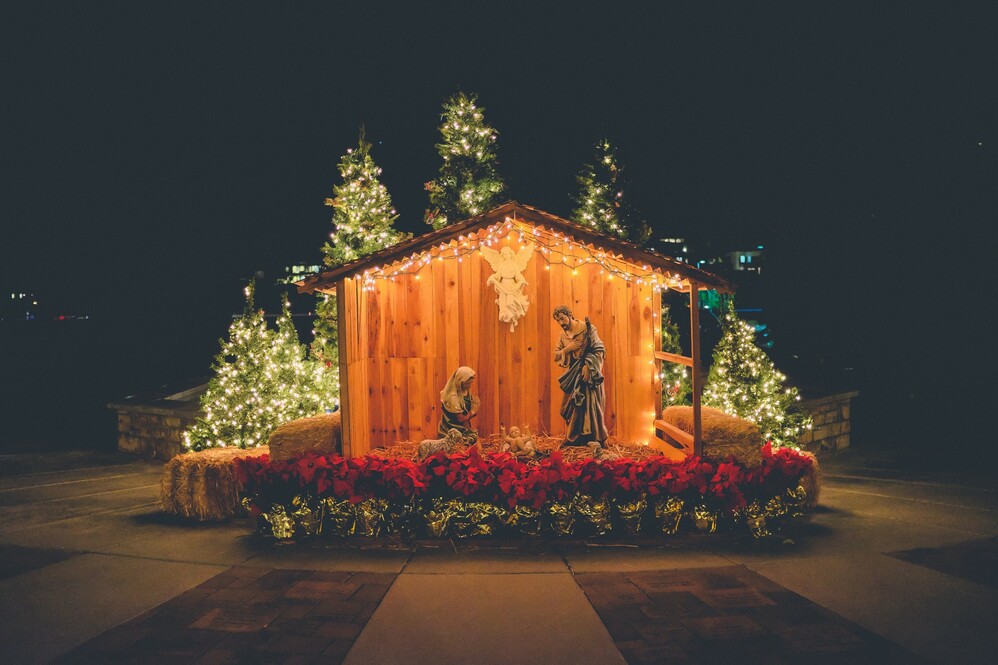Christmas Reflections from Campus Minister Tim Wood

Merry Christmas, everyone!
For today's blog, we have a reflection from our campus minister, Tim Wood.
Luke 2:1-20
I grew up in Our Savior’s Lutheran Church in Oconomowoc, Wisconsin. My family was fairly involved in the church when I was young. I regularly went to Sunday School, attended Vacation Bible School, and despite my tone-deafness, I sang in the Kids of the Kingdom Choir. I was also involved in our Christmas Pageant on multiple occasions. I must have been a bad actor because I remember being a donkey or a camel often (roles without speaking parts!). One year, however, I was able to shine as one of the shepherds—and a proud shepherd, I was!
In reality, however, in first century Israel there probably weren’t too many proud shepherds. Yes, King David was a shepherd, and the Old Testament often speaks positively about shepherds: “The Lord is my Shepherd…” But it seems that during the intertestamental period, the role of the shepherd moved from one of honour to one of indignity. In first century Israel shepherds were not just poor and uneducated, but they were deemed “unclean” by the rabbinic traditions. This “unclean” distinction is no small thing. It would mean shepherds would not be welcomed into any home of distinction in Israel.
Theologian Kenneth Bailey does a magnificent job describing this in his book, Jesus Through Middle Eastern Eyes. The shepherds are afraid when they are first visited by the angels who proclaim Christ’s birth, who wouldn’t be! But Bailey wonders if there is something more fearful for the shepherds than the celestial beings. He writes: “Initially (the shepherds) were probably frightened by the sight of the angels, but later they were asked to visit the child! From their point of view, if the child was truly the Messiah, the parents would reject the shepherds if they tried to visit him!” The shepherds know their place, and they are sure they would not be worthy to visit the newly born Messiah.
Notice how few details the angels give the shepherds. They don’t give them directions to the house of the newborn. They don’t tell them to talk to Larry, the owner of the house where the baby is. They don’t tell the shepherds what to say or do when they visit the child. Other than this being really good news for them, it isn’t clear why they need to visit the baby at all!
There is one thing the angels say, however, that would have brought great comfort to the shepherds: “This will be a sign to you: You will find a baby wrapped in cloths and lying in a manger.” When they hear this, they know that the child, the Messiah, is not in the manor of a wealthy and important Israelite. He is in a simple, lowly, ordinary Jewish home—a home not unlike their own. Even unclean shepherds will be welcome there.
How beautiful is our God—the first proclamation of the Good News is received by the lowly who are marginalized by their own community. Christ is born today, and the first proclamation is that God will not leave behind those seen as unproductive, unworthy, uninspiring, unintelligent, or unclean. More than that, Christ comes not to lift up his own name in the elite and important parts of society, but to lift up the names of those too often left behind by their society.
Immanuel, God with us…even with the shepherds…even with you. For at least a few moments, may we not be distracted by the hoopla and busy-ness surrounding the modern, North American Christmas season, but may we have hearts humble enough to receive this beautiful news and wonder how it might encourage and challenge us.